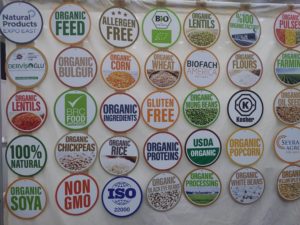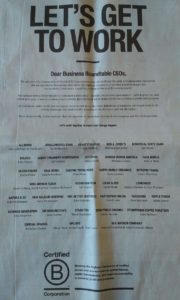Sugar in food products: A FoodNavigator collection of articles
I am reprinting this with no comments (beyond really, healthier marshmallows?) from the industry newsletter FoodNavigator. Here is its
Special Edition: Sweeteners and sugar reduction
Sugar continues to be in the spotlight, singled out as the nutrient responsible for alarming global rates of obesity and type 2 diabetes. Artificial sweeteners are also facing fire from consumers who want to adopt ‘clean’ diets. And while natural sweeteners are a preferred option, ingredients like stevia are notorious for their off notes. So what is the answer? We take a look at the latest thinking around sugar reduction, from the nutritional science underpinning the trend through to tech developments like so-called structured sugars.
- Better for you marshmallow: a healthy twist: To help children avoid excessive sugar intake, it is wise to teach healthy life styles and prevent overweight. Occasionally you can take a sweet treat. With a healthier marshmallow you are still able to control your calorie and sugar intake… Click Here
- Sugar reformulation: How are big brands innovating to cut the sweet stuff? With mounting pressure – both via voluntary targets and mandatory taxes – to reduce sugar in food and beverage, FMCGs are getting creative. Some are substituting sugar with coconut water, others with maize flour or tiger nuts. Scroll through the gallery to see who is doing what to cut the sweet stuff… Display
- Kerry talks sugar reduction in beverages: ‘It impacts the three most important sensory dimensions’: The push to reduce sugar in products, supported by regulatory levers such as sugar taxes, has focused largely on the beverage sector. Kerry Taste & Nutrition weighs in on the challenges facing beverage formulators… Read
- The FoodNavigator Podcast: Sugar reformulation part 1: Why reducing by stealth is key: The food industry is under massive pressure to reformulate products with less sugar. And in light of the voluntary target in the UK for manufacturers to meet a 20% cut in sugar by 2020 unlikely to be met, campaigners are increasingly demanding that mandatory sugar reformulation targets are set… Listen now
- Could SDIL’s sweet success expand beyond soft drink? ‘The lack of taxation for sugary milk drinks definitely needs more thought’: The UK’s soft drink tax has probably been of greatest benefit to the Childhood Obesity Plan, says Association for the Study of Obesity Chair Dr Maria Bryant, and similar principles should ‘absolutely’ be applied to sugary milk drinks… Read
- Tate & Lyle aims to cut carbon emissions 30% by 2025 as reformulation lifts profits: Tate & Lyle has announced a set of ambitious environmental targets including a commitment to cut Scope 1 and 2 CO2e emissions 20% by 2025 and 30% by 2030. Scope 1 and 2 are defined as direct emissions from owned or controlled sources, and indirect emissions from the generation of purchased energy, respectively… Read
- Beyond sugar and salt reformulation: The case for ‘positive nutrition’ targets to help curb obesity: Implementing ‘positive nutrition’ policies – to increase the amount of whole grains, fruit, nuts and seeds, and vegetables in our diet – could help the UK combat childhood obesity, argue experts… Read
- Making sweet food taste sweeter: Could coffee hold the key to sugar reformulation? Fresh research out of Denmark reveals that drinking coffee changes our sense of taste, making sweet foods even sweeter. Could these findings help inform sugar reformulation strategies?.. Read
- Was the failure of Nestlé’s Milkybar Wowsomes down to poor demand or poor marketing? Nestlé has pulled its reduced sugar Milkybar Wowsomes product after poor demand. But others believe big brands are scared to push their lower sugar products for fear of failure… Read
- Healy leverages cocoa shells for natural sugar reduction: Healy Group, the Ireland-based ingredient supplier, has developed a process to turn cocoa shells – an otherwise under-utilised by-product of cocoa production – into a micronised cocoa fibre that can help with sugar reduction in chocolate… Read
- Do low-calorie sweeteners make you fat? Controversy and confusion over the role of high-intensity sweeteners in weight management: The war on sugar continues to gather steam as increasingly health-conscious consumers seek to limit their intake by opting for products that are perceived as healthier. But controversy continues to swirl over the impact of high intensity sweeteners – a popular reformulation option – on health… Read
- Sugar reduction through smell: ‘Aromas can be used to produce long-lasting sweetness-enhancing effects’: One of the easiest ways to reduce sugar is to replace it with sweeteners – but research from Netherlands-based research group NIZO suggests aromas can be leveraged as an alternative path to sugar reduction… Read
- EY on the future of food: Tech innovation to deliver healthy, sustainable and personalised products: What does the future have in store for the food industry? We spoke to Ernst and Young’s Rob Holston, global consumer industries advisory lead, to hear his thoughts on the top trends and technologies at play… Read



